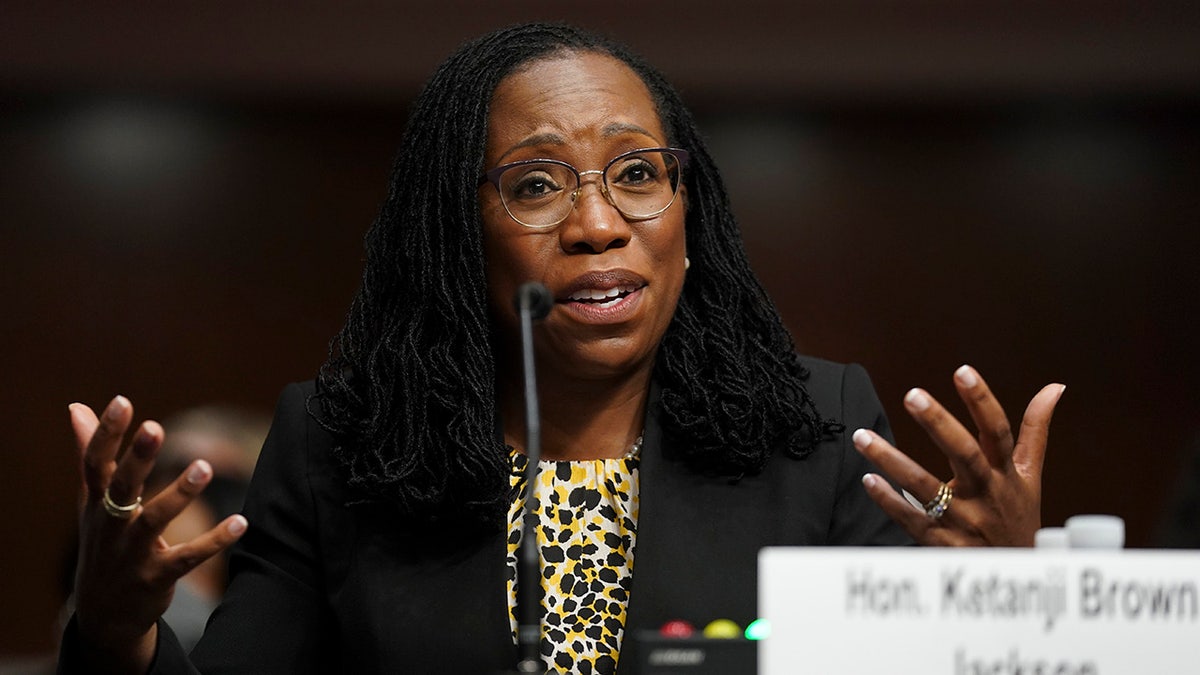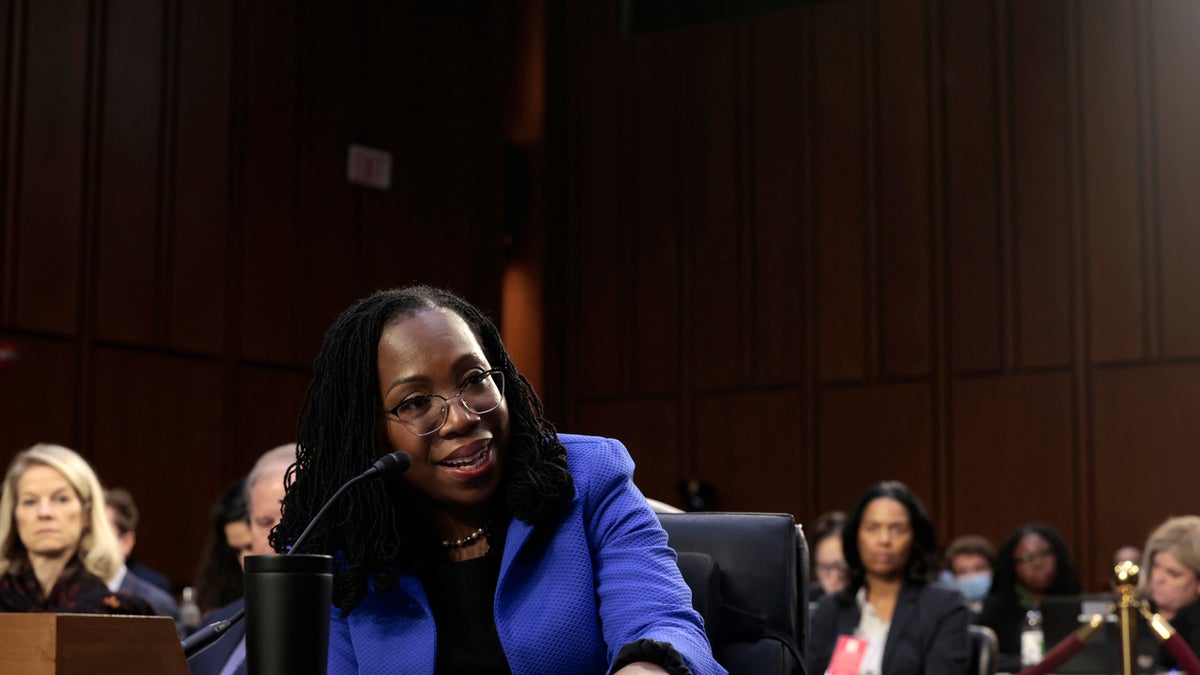Grassley: Ketanji Brown Jackson not giving answers on packing the Supreme Court
Sen. Chuck Grassley, R-Iowa, tells Shannon Bream that Supreme Court nominee Judge Ketanji Brown Jackson's records were withheld on 'Fox News @ Night.'
The second and third days of Judge Ketanji Brown Jackson’s Senate confirmation hearings, in which the justice was questioned at length by members of the Senate Judiciary Committee, followed a modern tradition for Democratic nominees of trying to sound very different from the card-carrying members of the Supreme Court’s liberal bloc that they turn out to be once confirmed.
Many of the questions this week focused on Jackson’s judicial philosophy. That is appropriate, because the topic goes to the definition of what kind of justice she would be. And it is a problematical area, because Jackson had said last year, while a D.C. Circuit Court nominee, that she did "not have a judicial philosophy per se."
This time, she gave an array of varying answers to the judicial philosophy questions. Interestingly, she included all the right buzzwords for mainstream appeal. She spoke about how judges have limited power and need to stay in their lane. She rejected the notion of "a living Constitution in the sense that it’s changing and it’s infused with my own policy perspective" and endorsed looking at the original public meaning of text—all while denying she is an originalist.
SUPREME COURT NOMINEE JACKSON DOESN'T 'QUITE REMEMBER THE BASIS' FOR DRED SCOTT DECISION
But talk is cheap. As I have earlier pointed out here, Jackson’s record, including her advocacy for terrorists, softness on crime, upholding racial preferences, hostility toward pro-lifers, and reversed decisions involving Trump-era policies, shows otherwise.
She tried to sound like an originalist or textualist because that is what Americans want in their judges. They do not want judges who are going to be politicians in robes, rubber-stamping radical left-wing policies.
Do not be taken in. We have seen this playbook before from Democratic nominees who end up being members of the Court’s liberal and firmly anti-originalist bloc. Justice Elena Kagan famously said during her nomination hearings that "we are all originalists." But once she was on the Court, she was glad to take anti-originalist positions, even explicitly distancing herself from "some people on this bench" who believe originalism "is the alpha and omega of every constitutional question."
There is no justice more committed to originalism than Justice Clarence Thomas. Jackson admitted years ago she did not understand him and has been known to disagree with his judicial philosophy. Is she now saying she has changed her mind?
MSNBC, CNN, OTHERS FLIP OUT OVER GOP QUESTIONING OF KETANJI BROWN JACKSON
Recall also Justice Sonia Sotomayor during her nomination hearings explicitly rejected President Obama’s "empathy" standard and said she accepted the Supreme Court’s decision in District of Columbia v. Heller (2008) protecting the right to bear arms. Once on the Court, she voted to undermine that right in a case involving another gun ban, McDonald v. Chicago (2010).

WASHINGTON, DC - APRIL 28: Ketanji Brown Jackson, nominated to be a U.S. Circuit Judge for the District of Columbia Circuit, testifies before a Senate Judiciary Committee hearing on pending judicial nominations on Capitol Hill, April 28, 2021 in Washington, DC. The committee is holding the hearing on pending judicial nominations. (Photo by Kevin Lamarque-Pool/Getty Images)
No one can say with a straight face that Judge Jackson is an originalist, and if there were any chance she would be an originalist justice, she would not be sitting in that chair.
Her testimony actually had the appearance of trying to have it both ways as she toggled between conservative-friendly statements and others that suggested she in fact has no clear approach to judging.
She repeatedly answered judicial philosophy questions with anodyne language about the need for judges to be impartial and said that her "philosophy is my methodology," an approach she developed "from experience, from practice, and consistent with my constitutional obligations."
WASHINGTON POST: KETANJI BROWN JACKSON TREATED WORSE AT CONFIRMATION HEARING THAN BRETT KAVANAUGH
Other statements she made were head-scratching. She referred at one point to the non-existent "Fourteenth Amendment substantive due process clause." That amendment contains a Due Process Clause that is fundamentally about process. There is a theory known as substantive due process, and that has been a favorite vehicle of liberals to pursue the freewheeling invention of new constitutional rights.
Jackson also claimed ignorance on some questions that should be very straightforward for anyone nominated to the Court. She was unable to describe the judicial philosophies of several sitting justices despite having been asked in advance of the hearings by Senator Ben Sasse to research that topic.
She did not remember the basis for the Dred Scott decision, arguably the Supreme Court’s most egregious decision ever and a staple in basic courses about constitutional law.
CLICK HERE TO GET THE OPINION NEWSLETTER
She said she was not familiar with United States v. Virginia, the landmark decision about the admission of women to the Virginia Military Institute in which Justice Ruth Bader Ginsburg wrote perhaps her best known opinion for the Court.
She said she did not know when life begins or when equal protection of the laws attaches to a human being.
She could not even provide a definition for the word "woman." Some of these questions should have been obvious to anyone whether or not they have a law degree.
Jackson did discuss the brief she filed in an abortion clinic buffer zone case and said that the area in which protests were prohibited restricted both pro-choice and pro-life people from entering. But it didn’t. Clinic workers were allowed within that area while protesters were excluded.
CLICK HERE TO GET THE FOX NEWS APP
The Supreme Court later decided unanimously that it was not constitutional, but Jackson apparently never familiarized herself with its holding, despite her amicus brief having been an issue raised repeatedly before her hearings.

WASHINGTON, DC - MARCH 23: U.S. Supreme Court nominee Judge Ketanji Brown Jackson speaks during her confirmation hearing before the Senate Judiciary Committee in the Hart Senate Office Building on Capitol Hill March 23, 2022 in Washington, DC. Judge Ketanji Brown Jackson, President Joe Biden's pick to replace retiring Justice Stephen Breyer on the U.S. Supreme Court, would become the first Black woman to serve on the Supreme Court if confirmed.
Judge Jackson’s flurry of philosophy-hedging rhetoric appears to be an attempt to make her all things to all people. But coupled with her record before her nomination and repeatedly pleading ignorance during her hearings, we are left with grave doubt that she would be a Supreme Court justice we could count on to faithfully interpret the Constitution.




